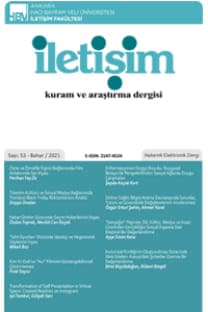Gözetim Toplumu Çerçevesinde İşyerinde Gözetim Uygulamaları: Fordist ve Postfordist Üretim Biçimlerindeki Gözetimin Karşılaştırılması
Surveillance Practices at Working Places within the Frame of Surveillance Society: The Comparison of Surveillance in Fordist and Post-Fordist Production Systems
___
- Amin, A. (1997). Post-Fordism: Models, Fantasies, and Phantoms of Transition, Post Fordism A Reader, (Ed. Ash Amin), Blackwell, Oxford Uk, S. 1-40.
- Anthony, G. (2008). Sosyoloji, Çev. Cemal Güzel, İstanbul: Kırmızı Yayınları.
- Aslan, O. E. (2005). Kamu Personel Rejimi, Statü Hukukundan Esnekliğe, Todaie Yayını, Ankara.
- Ball, K., Wilson, David C. (2000). Power, Control and Computer-based Performance Monitoring: Repertoires, Resistance and Subjectivities, Organization Studies, 21(2): 539-565.
- Belek, İ. (1997). Post Kapitalist Paradigmalar, Sorun Yayınları, İstanbul.
- Berger, J. (2006). Görme Biçimleri, Çev. Yurdanur Slaman, İstanbul: Metis Yayınları.
- Best, K. (2010). Living in the Control Society: Surveillance, Users and Digital Screen, Technologies, International Journal of Cultural Studies, sayı: 13 (1), s. 5-24.
- Binark, M. (2012). Türkiye'de Dijital Gözetim, Alternatif Bilişim Derneği Yayınevi: İstanbul
- Boyle, J. (1997). Foucault in Cyberspace: Surveillance, Sovereignty, and Hard Wired Censors, http://www.law.duke.edu/boylesite/foucault.htm, (16.11.2009).
- Bozkurt, V. (2015). Gözetim Toplumu ve İnternet, http://inet-tr.org.tr/inetconf5/ tammetin/bozkurt-tam.doc.
- Clegg, S.R. (1989). Frameworks of Power, London: SAGE.
- Çoban, B. (2008). Gözün İktidarı Üzerine, Panoptikon: Gözün İktidarı (Haz. B. Çoban, Z. Özarslan), İstanbul: Su.
- Çoban, B. (2014). Göz ve İktidar: Vitrinlere Değil Gökyüzüne Bak LAÜ Sosyal Bilimler Dergisi, Haziran.
- Dandeker, C. (1990). Surveillence, Power and Modernity, Polity Press.
- Dolgun, U. (2008). Şeffaf Hapishane Gözetim Toplumu, İstanbul: Ötüken Yayınevi.
- Dolgun, U. (2005). İşte Büyük Birader, İstanbul: Hayy Kitap.
- Doolin, B. (1998). Information Technology as Disciplinary Technology: Being Critical in Interpretive Research on Information Systems, Journal of Information Technology, 13: 301- 311.
- Drucker, P. F. (1993). Kapitalist Ötesi Toplum, (Çev. B. Çorakçı). İstanbul: İnkılap Kitabevi.
- Eco, U. (1998). Ortaçağ Estetiğinde Sanat ve Güzellik, (Çev. Kemal Atakay), İstanbul: Can Yayınları.
- Eraydın, A. (1992). Post-Fordizm ve Değişen Mekânsal Öncelikler, Ortadoğu Teknik Üniversitesi Mimarlık Fakültesi Yayınları.
- Foucault, M. (1977). Discipline and Punish: The Birth of the Prison, London: Penguin.
- Foucault, M. (2003). İktidarın Gözü, İstanbul: Ayrıntı.
- Foucault, M. (2005). Büyük Kapatılma, Seçme Yapıtlar: 3, İstanbul: Ayrıntı Yayınları.
- Fox, Nick J. (1998). Foucault, Foucauldians and Sociology, The British Journal of Sociology, 9 (3): 415-433.
- Gramsci, A. (1999) Selections from the Prison Notebooks, edt. Quentin Hoare and Geoffrey Nowell Smith, London: ElecBook.
- Gerrie, J. (2003). Was Foucault a Philosopher of Technology, Techné, 7(2): 14-26.
- Gökberk, M. (1974). Felsefe Tarihi, Üçüncü Basım, Ankara: Bilgi Yayınevi.
- Harvey, D. (1998). Postmodernliğin Durumu, Çev. Sungur Savran, Metis Yayınları, İstanbul.
- Hızır, N. (1981). Felsefe Yazıları, Birinci Basım, İstanbul: Çağdaş Yayınları.
- Karakehya, H. (2009). Gözetim ve Suçla Mücadele, Ankara Üniversitesi Hukuk Fakültesi Dergisi, sayı: 58, s. 319-357.
- Kosgeb, (2005). Ekonomik Kalkınmada Sosyal Sermayenin Rolü, Ekonomik ve Stratejik Araştırmalar Merkezi Müdürlüğü Yayını, Ankara, http://www.kosgeb.gov.tr/.
- Kumar, K. (1995). Sanayi Sonrası Toplumdan Post-Modern Topluma, Çağdaş Dünyanın Yeni Kuramları, (Çev. Mehmet Küçük), Dost Kitabevi Yayını, Ankara.
- Küçüköner, M. (2005). Görme Üzerine Bir İnceleme, Atatürk Üniversitesi Güzel Sanatlar Fakültesi Dergisi, Sayı:8.
- Lacombe, D. (1996). Reforming Foucault: A Critique of the Social Control Thesis, The British Journal of Sociology, 47(2): 332-352.
- The Latest on Workplace Monitoring and Surveillance", 13 Mart 2008, http://www. amanet.org/training/articles/The-Latest-on-Workplace-Monitoring-and-Surveill aspx, (Erisim Tarihi: 10.06.2016) ance.
- Lyon, D. (1997). Elektronik Göz, İstanbul: Sarmal.
- Marx, K. ve Engels F. (2005). Komünist Manifesto ve Komünizmin İlkeleri, (M. Erdost çev.). Ankara: Sol Yayınları.
- Marx, Gary T. (2002). What's New About the New Surveillance? Classifying for Change and Continuity, Surveillance and Society, Sayı:1.
- Murray, R. (1989). Fordism and Post-Fordism in Hall And Jacques.
- Palen, L.; Dourish, P. (2003). Unpacking 'Privacy' for a Networked World, Proceedings of the SIGCHI Conference on Human Factors in Computing Systems, Conference on Human Factors in Computing Systems Ft. Lauderdale, Florida, USA, April 05 - 10.
- Regan, Priscilla M. (1996). Genetic Testing and Workplace Surveillance, Lyon, David/Zureik, Elia (eds), Computers, Surveillance and Privacy, Minneapolis, University of Minnesota Press: 21-46.
- Rigel, N. (Ed.) (2005). Kadife Karanlık: 21. Yüzyıl İletişim Çağını Aydınlatan Kuramcılar, İkinci Basım, İstanbul: Su Yayınları.
- Rooney, D. (1996). A Contexualising, Socio-Technical Definition of Technology: Learning from Ancient Greece and Foucault http://www.google.com.tr/#hl=tr&source=h p&biw=1276&bih=627&q=A+Contextualising%2C+SocioTechnical+Definition+of+Te chnology%3A+Learning+from+Ancient+Greece+and+Foucault&btnG=Google%27da+ Ara&aq=f&aqi=&aql=&oq=&gs_rfai=&f =a4289074fca3ad54,
- Rouse, J. (1994). Power/Knowledge, Gutting, Gary (ed.), The Cambridge Companion to Foucault, Cambridge, Cambridge University Press: 92-114.
- Saklı, A. R. (2007). Kapitalist Gelişim Sürecinde Fordizm ve Post - Fordizm, Ankara.
- Sartori, G. (2004). Görmenin İktidarı (Çev. Gül Batuş, Bahar Ulukan), İstanbul: Karakutu Yayınları.
- Slater, P. (1998). Frankfurt Okulu, İstanbul: Kabalcı Yayınları.
- Townley, B. (1993). Foucault, Power/Knowledge, and Its Relevance for Human Resource Management, Academy of Management Review, 18(3): 518-545.
- Virilio, P. (2002). Enformasyon Bombası, (K. Şahin çev.). İstanbul: Metis Yayınları.
- Weber, M. (2004). Sosyoloji Yazıları, (6. Baskı). (T. Parla çev.). İstanbul: İletişim Yayınları.
- Workers' Privacy Part II: Monitoring and Surveillance in the Workplace, Conditions of work digest, Volume 12 Number 1 1993, Geneva, International Labour Office, http:// www.ilo.org/public/libdoc/ilo/P/09921/09921(12).pdf, (Erisim Tarihi: 10.06.2012)
- Wood, D. M. (2009). The Surveillance Society: Questions of History, Place and Culture, European Journal of Criminology, sayı: 6 (2), s.179-194.
- Yayın Aralığı: 3
- Başlangıç: 1983
- Yayıncı: Ankara Hacı Bayram Veli Üniversitesi İletişim Fakültesi
Milliyetçi Fikir Dergiciliği Yayınlar Bibliyografyası
Çerçeveleme Kuramı Bağlamında Kamuoyu Oluşturmada Spin: Birinci Körfez Savaşı
Yunus Emre TOPRAK, Muharrem ÇETİN
Politikada Yeni Ruhban Sınıfı: Siyasa ve İkna Uzmanları Olarak Politik Profesyoneller
Radyonun Demokratikleştirilmesinde Yeni Bir Olanak: İnternet Radyoculuğu
Pepee Çizgi Dizisinde Toplumsal Cinsiyet Rollerinin Üretimi
Emine Şeyma TAŞDELEN, Mehtap ÖZSOY
Kişilerarası İletişimin Dijitalleşmesi: E-Forum Etkileşiminin Tüketici Davranışına Etkisi
M. Umut TUNCER, Aslı TUNCER İCİL
Avusturya'da Yaşayan Türkiye Kökenli Göçmenlerin Medya Kullanımı Üzerine Bir İnceleme
Annan Planı Referandumu Sürecinde Rauf Denktaş'ın Ötekileştirilmesi: Yeni Düzen Gazetesi Örneği
